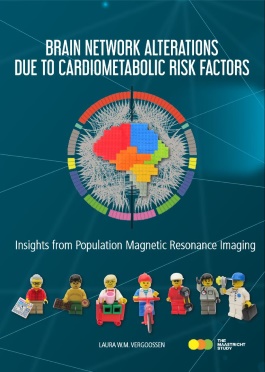PhD conferral mrs. Laura W.M. Vergoossen
Supervisor: prof.dr.ir. W.H. Backes
Co-supervisors: dr. J.F.A. Jansen, dr. M.T. Schram
Key words: Magnetic Resonance Imaging, cardiometabolic risk factors, white matter connectivity, Diffusion Tensor Imaging, Physical activity, Type 2 diabetes
"Brain Network Alterations due to Cardiometabolic Risk Factors; Insights from Population Magnetic Resonance Imaging"
This thesis investigated whether life style related risk factors are associated with novel neuronal imaging markers and evaluated the value of structural and functional brain network measures for that purpose. The life style related risk factors, also called cardiometabolic risk factors, studied in this thesis are (pre)diabetes, physical inactivity, high sedentary time, high blood pressure, obesity, and high cholesterol. The research summarized and extended the existing evidence on associations between cardiometabolic risk factors and subtle brain changes as assessed by structural and advanced Magnetic Resonance Imaging (MRI). More specifically, it was found that high blood sugar was associated with structural brain alterations, even in the prediabetes phase. Physical inactivity was also associated with structural brain alteration, especially in brain regions highly specialized in motor function. Furthermore, the research found an interrelation of brain damage in the form of white matter lesions (WML), structural brain alterations, and cognitive function. In particular, WMLs in structural brain connections important for information processing speed were associated with cognitive slowing. Finally, the research observed that neuronal and non-neuronal physiological signals could be recognized in the functional MRI signal, and that this signal is altered in people with cardiometabolic risk factors.
